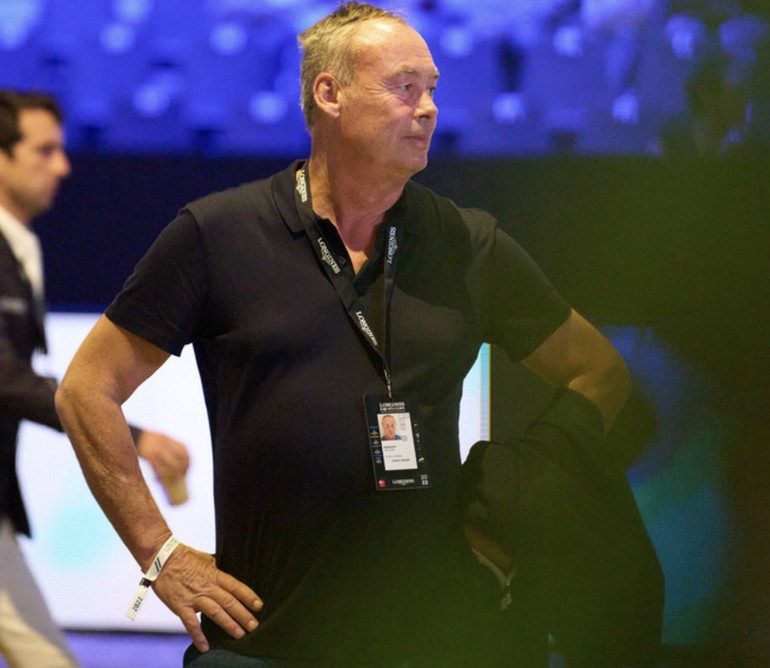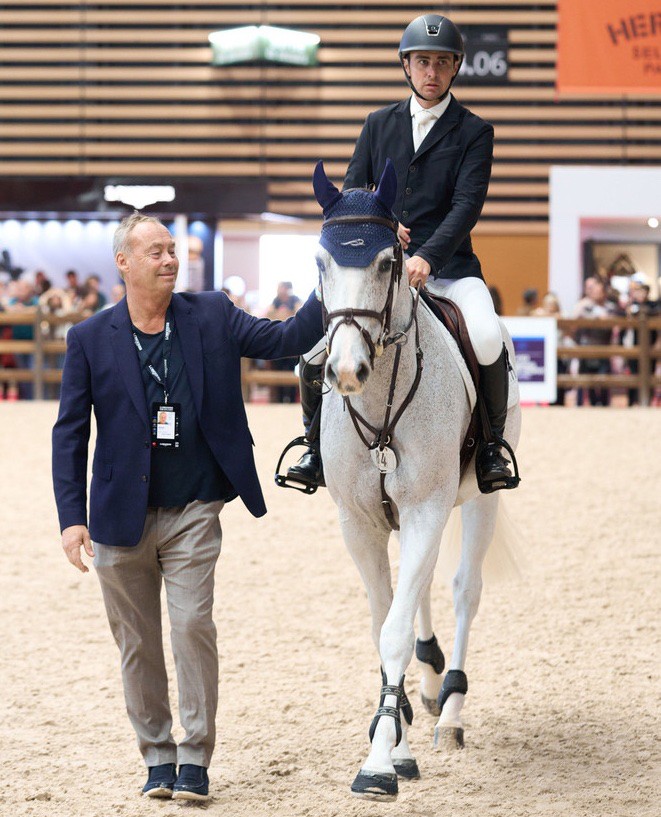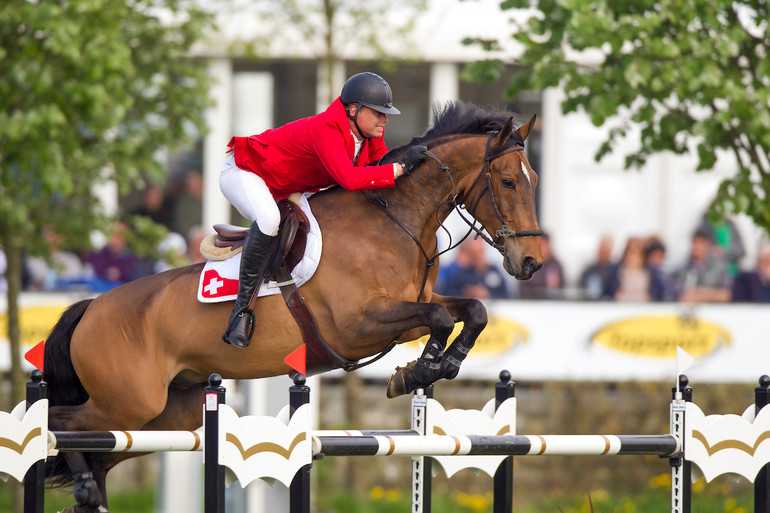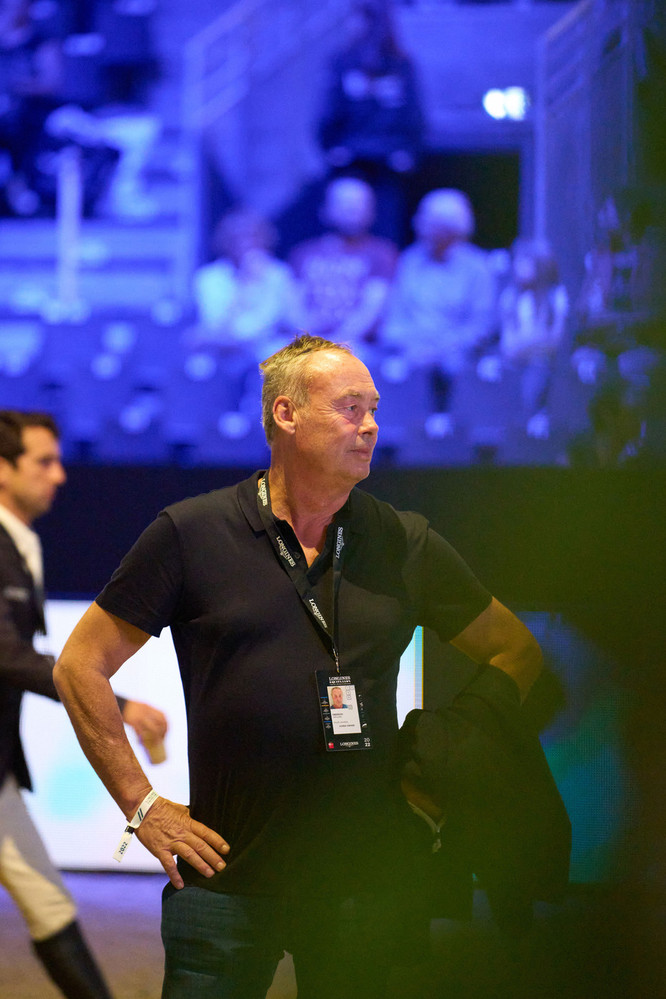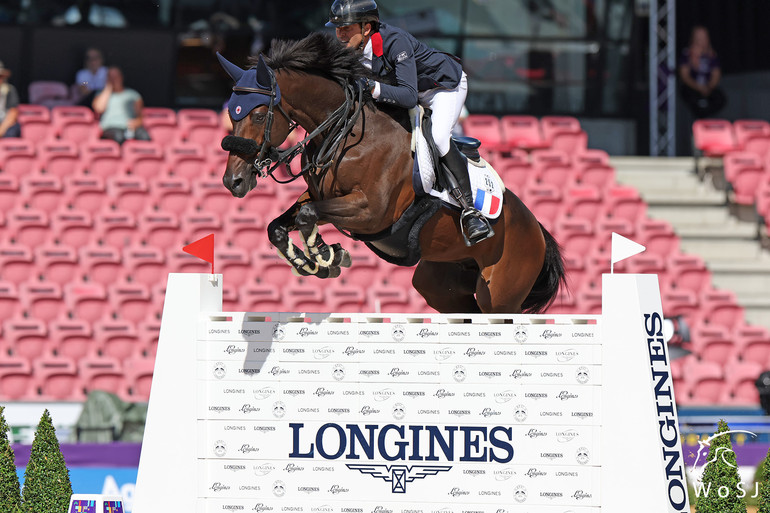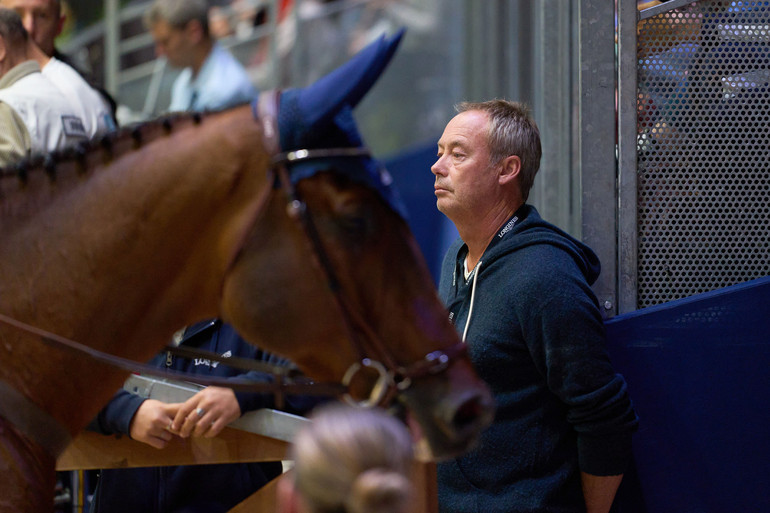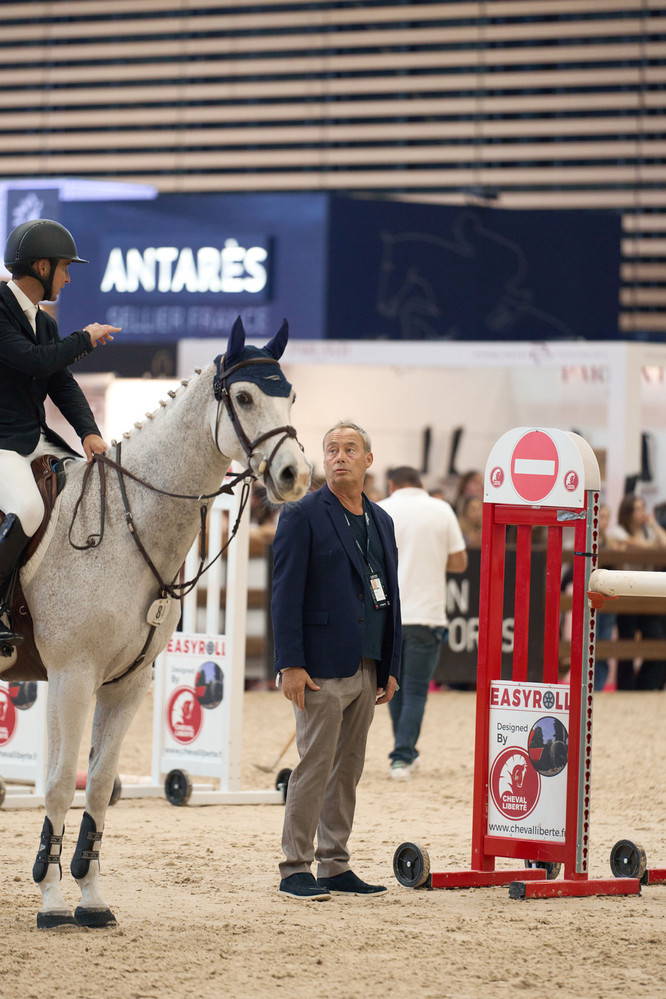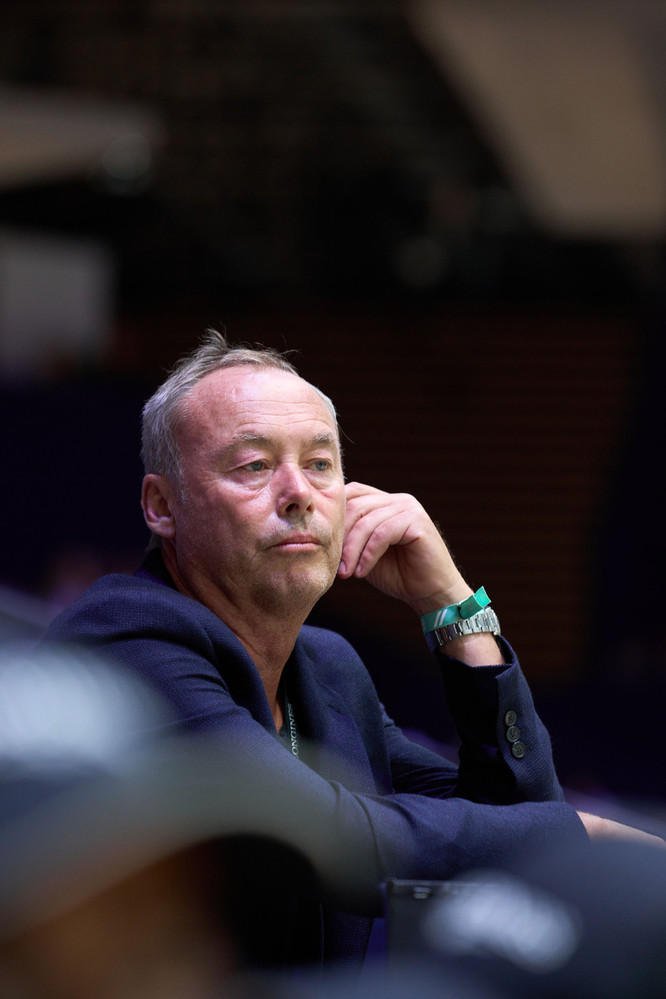Text © World of Showjumping
Born in Switzerland, Grégoire Oberson represented his country from his early junior years to senior level, jumping in more than 60 Nations Cup, two World Cup Finals, winning Grand Prix classes, as well as the World Cup in Oslo back in 1992 – but if you ask him, he never considered himself a star rider. After deciding to end his showjumping career, Oberson has focused on buying and selling top horses – Martin Fuchs’ Clooney and Simon Delestre’s Cayman Jolly Jumper being just two examples of his exceptional eye for talent. To World of Showjumping, the 58-year-old shares his thoughts on a change in the sport that forced him to stop riding and focus on the business-side instead, his love for horses and how his emotions on the side-lines have surprised him.
In between two great generations
“I was in between two generations of great riders in Switzerland; I rode Nations Cups with both Philippe and Steve Guerdat, and I worked with Thomas and Renata Fuchs before Martin was born,” Oberson tells about his background. “At the time, I was a good enough rider and jumped clear in many Nations Cups. However, with the evolution of the sport, keeping the top horses became harder and harder. Because I did not have huge financial support, I always needed to sell my horses – I had to really work for it and could never keep them. Furthermore, when I bought horses, I did not have the money to go to the best dealers and buy the most expensive horses; I had to go a bit outside the classical way and find the best I could afford back then. At that time, it was also easier to find a sponsor in the German part of Switzerland, and I am born in Geneva, which is the French part – the weaker region when it comes to showjumping. So, in 1999, I decided to move to Belgium to work with the Pessoa-family.”
“At the beginning of the new millennium, the sport started to change a lot,” Oberson continues. “Prior to 2000, the Nations Cups and the World Cups were the most important shows, there were no tours or other five-star events. When the Riders Tour was launched in Germany, Paul Schockemöhle was one of the first to create change in the sport. Prior to this, going to the shows was down to your federation, they selected who was riding where. However, when additional five-star shows started to appear, it became more and more a deal between the shows and the riders; you were able to pay your way into the sport. We got more shows, and more wealthy people got involved – which is good for the business.”
I don’t want to be an industry, I want to be haute couture – small, with super quality
Eventually, Oberson stopped competing in 2013. “It started to get too complicated to stay within the top 200 on the ranking, and to go to the good shows. Therefore, I decided to focus on the buying and selling instead and found a couple of good partners who were ready to invest with me. The first really good horse that we bought was Con Dios for Martin Fuchs, that later was sold to Rene Lopez and ended up jumping very good with him. Step by step the business evolved; we bought Clooney and Cynar VA, and for the past ten years my job has been to find the best possible young horses, produce them and sell them when they reach the high level.”
These days, Oberson shares his time between Belgium and France. “We have a stable in Deauville, close to the racetrack,” he tells. “For the past two years, Duarte Romao rode for me and now I have Philippe Emerald and Alexa Ferrer who are both based at my yard. When we first moved to Deauville in 2014, I got into racehorses a little bit as well. We are neighbours to one of the biggest race stables in the world, owned by the Wertheimer-family – the owners of Chanel. We have a small department for racehorses, but my first activity, by far, is showjumping.”
The charm of the game
Oberson’s main partners are the Fuchs-family, the Azevedo-family, his best friend Julien Epaillard, as well as Piergiorgio Bucci and Pius Schwizer. “Every now and then, I buy horses with other people as well; I am not closed, I am quite open,” he explains.
Finding the right rider for each horse is something Oberson is very particular about. “First of all, a rider has to love their horse,” he says. “For me, if I see a rider lose interest in my horse, that is an absolute no go. The horse has to feel it is loved, otherwise you have no chance. With love also comes faith; as a rider, you have to believe in your horse. After, it all depends on the quality of the rider. There are some physical points you have to consider as well; for sure I could not give Cayman to Piergiorgio Bucci, who is over 1.80m. Sometimes you can get surprised by who matches with who though, and that is part of the magic of our sport.”
A true connection is instant
“I think you can see a connection very quickly: Maybe the success is not there directly, but a match you can see directly – a true connection is instant,” he continues. “Our sport is the only sport in the world where you have this; a feeling, a connection between a horse and a rider – it is almost spiritual, something you cannot explain. For me, it is a huge part of the charm of the game.”
“I buy and sell about 20 horses annually,” Oberson continues. “I am very small in numbers and prefer to stay that way. I don’t want to be an industry, I want to be haute couture – small, with super quality. I don’t care to have 50 horses and five riders, it is not my goal and not my type of life. I want to focus on a small group of quality horses and good people. Many people don’t want to sell their good horses, but I live from that, so I will sell. And I get good feedback on the horses I sell, that is important for me as well. I don’t want to be bigger than I am today, it is hard enough to find the number of good horses we have, and it takes a lot of time too.”
Fishing where no fishermen go
When looking for horses, Oberson likes to go where no one else goes. “I have a couple of friends – old connections – who let me know if they see an interesting horse,” he tells. “I love to take my dog and drive alone, I like to go where no one else goes. If you go to a show in Belgium or the Netherlands, you have nearly more dealers than horses – I try to catch the fish where not many fishermen go. I love to buy horses in France and Germany, I like to buy directly from the breeders, to find the horses right at their base.”
If you go to a show in Belgium or the Netherlands, you have nearly more dealers than horses
Martin Fuchs’ Clooney is one of the most successful horses Oberson has had, and currently Simon Delestre’s Cayman Jolly Jumper is making waves in the top of the sport. “I saw Clooney in Lanaken with Jana Wargers, he was jumping good,” Oberson recalls about his first impression of Clooney. “Michael Cristofoletti told Martin about the horse. There was a lot of interest in him, and finally Thomas, Martin and I went to Germany to try him. We bought him at the end of his 7th year. He became good very quick, and in 2016, after the Rio de Janeiro Olympic Games, we sold him to Mr. Luigi Baleri. Both Cayman and Clooney are geniuses in their own ways, they have many common points. They both have a huge canter, a strong character, they are both careful with the last scope. For me Cayman is a favourite for the next Olympic Games – if nothing happens, touch wood. I am sure he will win something big one day.”
“Discovering horses is really interesting, it is a passion for me,” Oberson continues. “I did not expect the feelings, emotions, pleasure and adrenaline I can still enjoy when seeing my horses jump with someone else – that surprised me when I stopped riding. I really love going to the biggest shows, I am traditional and love shows with history; Aachen, Dinard, Dublin, St. Gallen… I have felt emotions that have maybe been even stronger than when I was riding myself – I get even more nervous! I really live each story; I am not cold in that sense.”
Light off the ground
“Since the very beginning of our sport, you always needed a careful horse,” Oberson explains when asked what he looks for in a horse. “If you open an old book from the military 50 years ago, that is what you will find. Now, the courses are lighter and more technical, so you need a very light, very intelligent horse with a lot of reflexes. You can have a big horse that is smart and quick, or you can have a small horse… but first and foremost, you really need a horse that is reactive. They have to think quickly and be top careful. Also, the horses cannot be too complicated to ride; the courses are so technical nowadays, you need to have a horse that is easy to ride. Cayman is maybe the exception to this – but there is always an exception to confirm a rule.”
I don’t have time for mistakes, so I try to follow my feeling
“For sure I look at the way they move,” he continues. “I love horses that are light off the ground. A horse can be a heavy type, but the jump must be light – that is the first thing. They have to be careful, that everyone knows. I prefer to see the horses in real life, not only on a video. I like to go and watch them at a show, see how they behave in the warm-up… And after, it is really a question of my feeling; I need to feel something in me that excites me – it is something I cannot explain. I know that if I don’t feel anything, there is no point to buy; I have tried a few times, tried to convince myself that everything was good, but when I don’t follow my instinct, normally I am wrong. And with my age, I don’t have time for mistakes, so I try to follow my feeling!”
Recognize a talent when you see it
When Oberson was still riding, he used to sit on the horses himself before buying. While his decisions are based solely on the feeling he gets, not riding has given him more clarity. “I think I buy better horses without sitting on them! In the end, when you are a rider, you always think that you can change something, improve this, improve that; you are not really focused on what you really have right there, in that moment,” he explains. “When I was a rider, I used to buy horses with a dream in my head about certain shows, I was confusing my judgment. When you don’t sit on a horse, you can only judge what you see. Now, I am very cold when I buy; I buy for the business. In my opinion, I am a better buyer now than I was when I rode. But this is personal; I don’t sit on the horse to feel them, I need to feel the horse just by seeing them. Until now, I didn’t make so many mistakes this way.”
When I was a rider, I used to buy horses with a dream in my head about certain shows, I was confusing my judgment
“Being humble is not really my best quality,” Oberson laughs. “Many people speak about luck, but I don’t believe in luck. The only luck you need, is to arrive at the right place on the right day, but you need to be good enough to recognize a talent when you see it. There are a lot of horses that have for sure not been found! After finding the right horses, it all comes down to management. We try to have a good system. As an example, Duarte really wanted to take Cayman to the European Championship last year, but I said it was too early. We take our time with the horses, especially when we know we have a good one; if you hurry, you will pay later. You have to build horses with a long term perspective, not try to get out what you can on short term. I try to build horses that can reach the top and stay there. To have a horse win a lot for a few years, many can do – but to keep a horse at the top for ten years? That for me is success.”
Horses are a part of the human history
When it comes to the future of equestrian sports, Oberson believes that the way the sport evolves in Europe tends to follow what happens in the States. “Before, people bought horses for their riders; now they buy horses for themselves, for their children,” he explains. “There are less and less big owners, and more and more amateurs that buy horses for their children or for their trainer – and this started in the States. I was riding over there in the 90’s, and 80% of my friends from that time have gone from riders to trainers. For the business, it is good, but for the sport, I think many good riders struggle with having enough good horses. There are not many people who purely support the sport of showjumping, like you have in the racing world, where buying a racehorse is really an ownership in support of the sport in general. In our sport, everything is getting mixed, and that will be the future. However, it is not that someone rich cannot become a good rider; there are many riders from strong financial backgrounds who have developed into super riders. I believe it will become harder and harder for a rider who has no financial support to really reach the top. For me, if I was born 40 years later, it would be impossible to achieve now what I achieved back then – impossible. The cost of the sport is so high; it has multiplied 10-20 times since my time. Also, the quality of riders has evolved; everyone rides better and better. Before we had maybe 50 good riders, whereas now that number is for sure closer to 300. The sport is starting to be very competitive, but if you look at any other professional sport – F1, tennis, golf – it’s a very competitive world we live in.”
What I love the most about it, is finding a connection with a horse
“However, I believe our sport is on a good track,” Oberson concludes. “Equestrian sports are a part of our history, the human history. Horses have done a lot for us; in the war, in the fields – it is a long story between horses and humans. There are many people who are not involved in the sport but love horses; horses are one of the most loved animals in the world – and you see that across different cultures as well. What I love the most about it, is finding a connection with a horse; trying to be in their mind, that is the most fascinating thing. And most of all, I love seeing my horses happy. There are so many different aspects and emotions to horses and our sport that I enjoy. I could not live without horses; they are a part of me.”
No reproduction without written permission, copyright © World of Showjumping.com



